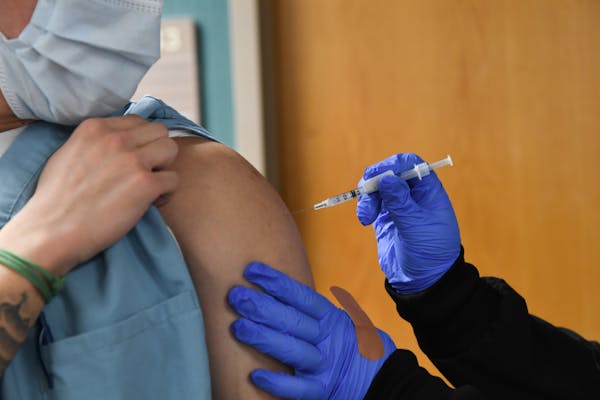Minnesota pharmacies and health care providers are asking to be tapped to distribute the COVID-19 vaccine as residents clamor for a coveted appointment at one of just nine administration sites scattered across the state.
"Pharmacies are eager to administer the COVID vaccine," said Sarah Derr, executive director of the Minnesota Pharmacists Association, who told a Minnesota Senate health committee Wednesday that nearly 560 pharmacies have registered to be vaccine providers.
"Pharmacies are currently a little frustrated as they have not heard of any plans … in contrast to pharmacies in other parts of the country," she said.
Local providers say they can offer easier access to vaccines, as the priority for administering the shots shifts from health care workers and long-term care residents to the broader 65-and-over population.
"I don't want to see my 85-year-old mother drive from St. James to North Mankato," said Lee Landsteiner of NuCara Pharmacy in Paynesville. "I would prefer that she just drive three minutes to the other side of town."
North Mankato is one of nine sites that will start giving vaccines to about 12,000 people, including some educators and child-care workers, starting Thursday.
Sen. Michelle Benson, chairwoman of a key Senate health committee, said the Minnesota Department of Health took a wrong turn when it decided to set up the pilot clinics.
"Rolling out the nine pilot sites was premature," the Ham Lake Republican said. "We have people all over the state who are part of the influenza vaccine distribution. We could use our existing infrastructure."
Benson said a state site would make more sense for targeted vaccine campaigns, such as at a college or university, when vaccines become available.
"There's nothing premature about putting the necessary infrastructure in place to get vaccine to Minnesotans quickly when we have the chance," state infectious disease director Kris Ehresmann told the Star Tribune.
"Pharmacies and existing health care providers will also play a critical role. But we need to develop the best practices now that will be necessary when the federal government increases supply," she said.
Landsteiner said that state and local health officials have not approached him as part of their planning efforts.
"I have yet to be asked what my vaccine capacity is," he said. "We are ready to help. Pharmacies already have the infrastructure right in place."
So far, 200,840 Minnesotans have been vaccinated against a relentless disease that has taken 5,979 lives and sickened at least 449,492 people across the state.
At times, the shots are progressing at a pace that seems glacial, with a total of just 1,742 total doses given last Saturday and Sunday, the most recent days for which data is available.
Minnesota health officials say that reporting delays cloud the true vaccine picture, noting that most of the highest-priority health care workers have gotten at least one dose and that all 369 nursing homes have had their first doses delivered.
About 40% of the nearly 597,000 doses delivered to health care providers and long-term care facilities have been used, according to a state tracking website.
The nine state vaccination sites are meant to pave the way for more community sites that would ramp up as the federal government allocates more doses to the state.
"We currently have an extreme shortage of vaccine in Minnesota, and now is exactly the right time to be doing this work to make sure we can get vaccine to all Minnesotans when supply meets demand," said Ehresmann.
With demand in the highest-priority groups easing, some vaccines are making their way to health care organizations for their patients.
About 4,900 doses were sent to the 17 clinics of the Minnesota Association of Community Health Centers network.
"The patients we serve are the communities of color who really are disproportionately suffering under COVID," said Jonathan Watson, executive director of the association.
The doses are reserved for the clinics' 21,000 patients age 65 and over, Watson said.
"We are calling patients and scheduling them as quickly as possible," said Colleen McDonald Diouf, chief executive at Community-University Health Care Center in south Minneapolis.
"Some do also have vaccine hesitancy, so there is also the education to get people comfortable to get the vaccine," she said.
Other clinics, including HealthPartners, are preparing for the day when they can offer vaccines to their patients. The Bloomington-based health care system has sent e-mails or letters to its patients laying out steps on how they can schedule a vaccine appointment.
By Feb. 8, it hopes to have 13 vaccination sites, including two drive-through locations, that could handle 7,500 shots a day — if they have the vaccine supply.
"Our state's clinics and health care systems have the capacity to vaccinate a lot of people quickly," said Dr. Mark Sannes, an infectious disease physician who is aiding the system's COVID-19 response. "If we had a full vaccine supply we can offer more vaccines in a single day than we can currently in a week."
But some clinics that are not affiliated with the state's larger health care systems say that they are struggling to get their employees, let alone their patients, access to the vaccine.
Troy Simonson, chief executive of the Infinite Health Collaborative, which includes independent specialty clinics that employ 180 doctors and 2,500 workers, said he has two employees who are trying to obtain vaccines.
"We never received any information on if and when we could potentially receive the vaccine" despite filing the necessary paperwork with health officials, he said.
"I would ask that ultimately the Department of Health recognize that there are many independent practices across Minnesota that are willing and able to administer the vaccines to their staff," Simonson said.
Glenn Howatt • 612-673-7192

Ex-Minneapolis officer Thomas Lane finishes federal prison time in George Floyd killing

Lacrosse lists: 21 top players and the school that's No. 1 for boys and girls

Rep. Ilhan Omar's daughter suspended from college for involvement in pro-Palestinian protests

